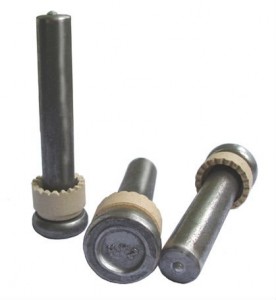Choosing the right stud is imperative for any stud welding job. The type of weld stud is chosen based on the chemical properties of work metal, the mechanical properties of the stud, and the type of fastener being used. Below, we have listed some of the important specifications concerning low carbon steel, high strength steel, stainless steel, and aluminum alloy Arc studs.
Low Carbon Steel Weld Studs
- Chemical Properties: Low carbon steel studs contain a maximum of .23% Carbon. The other components include phosphorous (.040% max), Manganese (.90% max), Silicon (.050% max).
- Mechanical Properties: These studs have a minimum tensile strength of 60,000 PSI and a minimum yield strength of 50,000 PSI. If the studs are made of annealed low carbon steel, they have a minimum tensile strength of 50,000 PSI and a minimum yield strength of 35,000 PSI.
High Strength Steel Weld Studs
Just like its name would imply, high strength steel is an extremely strong material. Studs made from this material have a minimum tensile strength of 120,000 PSI.
Stainless Steel Weld Studs
At Sunbelt, we have a variety of stainless steel options. These specifications apply to Type 302/304/305/316 stainless steels. Studs made of these types of stainless steels have a minimum tensile strength of 85,000 PSI and a minimum yield strength of 40,000 PSI. If composed of annealed stainless steel though, these studs have a minimum tensile strength and yield strength of 80,000 PSI and 30,000 PSI, respectively.
Aluminum Alloy (5000 Series) Weld Studs
The basic mechanical properties of these studs include a minimum tensile strength of 42,000 PSI and a minimum yield strength of 30,000 PSI.
Our team is more than happy to speak with you to help you determine which stud is best for your stud welding project. Call Sunbelt at 713-939-8903 today!

